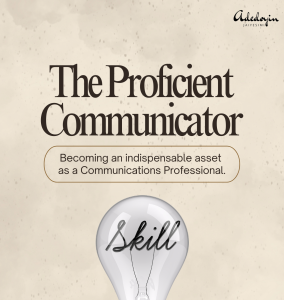We are in the information age and every day, we are bombarded with content from different angles. In order to sieve the information that comes their way in the digital space, people are increasingly paying attention to content that comes from sources that they trust; both corporate and individual.
To successfully make your mark and build a strong personal brand online, it is therefore important to position yourself as a thought leader. As a thought leader, you become a credible source of information in a particular field and you will be positioned as an authority figure in the minds of those seeking for industry related information.
The higher you rise in your career and the more strides you make in business, the more imperative it is for you to be mindful of how your brand is being positioned online. As someone who is known as a leading expert in the tech industry for example, people should not have to get to the fourth page of a Google search before they find relevant information about you. I’d also like to add that if your name comes up on the first page, the information there should not just come from external sources like newspaper interviews and features, neither should that page only showcase your social media handles. There must be content on that first page of a Google search that showcases you to be the tech expert that you are.
Here are some things you need to consider to position your brand as a thought leader.
Have a Personal Website. Your brand identity online must begin with a personal website. It is good to share your thoughts on Facebook, Twitter and Instagram, but it is better for you to have a personal website that will house all your content and will provide a platform for people to easily glean from the wealth of knowledge that you have. Imagine if social media shuts down today, all your content there will be gone. Your personal website, however, will be there for as long as you want it.
Share valuable content. Your personal website needs to have a blog where you can share valuable content. You can use your blog to share articles, tips, important business and career lessons. The articles you share should be optimized from search engines (SEO) so that they will be discovered easily when people use search terms related to your industry or field.
Re-purpose your content. Many times, people believe that they lack enough content to have a thriving personal website but this is not always the case. If you are a professional or business woman who grants interviews, speaks at conferences and events and you share your opinion on different platforms, then you have content. What you need to do is to gather those content and see how they can be re-purposed for your website. For example, the speech you shared at a conference can be broken down into a series for your blog. An interview posted on YouTube can be transcribed into how-content for your website.
Distribute your content strategically. Aside from hosting your content on your website, you must also distribute strategically to other platforms for optimum visibility. What are the leading platforms for your industry and what are the platforms that are widely read by the demographic that you want to target? You should aim to send your content to a mixture of different platforms. Remember, the key is to do this strategically.
Positioning your brand properly in the digital world is not something that is difficult to achieve, especially when you have a strong brand offline. Creating the right strategy is key and consistency in creating valuable content is also very important. This is what will make you stand out and keep you at the top in the overcrowded digital space.



